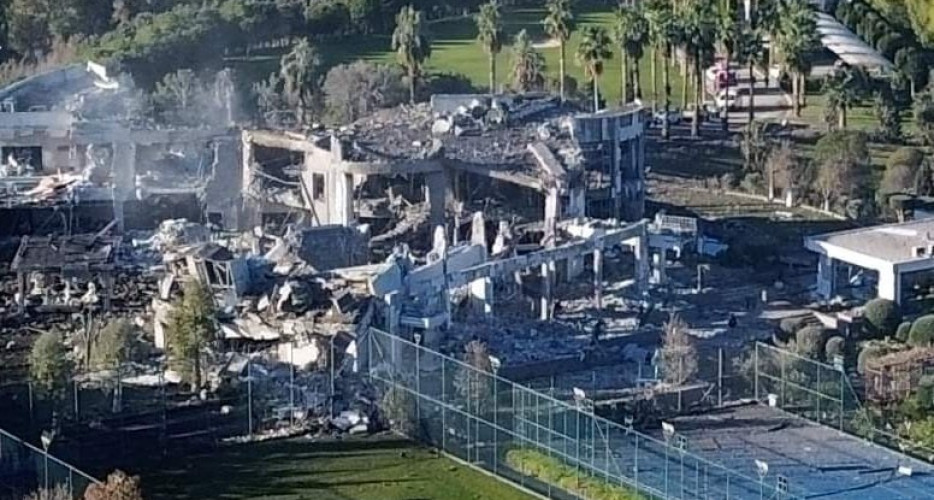
Peregraf
Iraq is doing little to prevent continuous airstrikes on the Kurdistan Region from neighboring countries that kill and wound civilians. The Kurdistan Regional Government (KRG) lacks the capacity to prevent them itself. The International Coalition only protects its own facilities, drawing criticism from the Kurdish public.
On January 15, Iran’s Islamic Revolutionary Guard Corps (IRGC) fired ten ballistic missiles at the Kurdistan Region’s capital of Erbil, killing at least four civilians and wounding seventeen others. Prominent businessman Peshraw Dizayee and Karam Mikhail were among the dead, along with Dizayee’s infant daughter and a Filipino worker.
“I think Iran is shelling us because of the Kurdistan Region's friendship with the United States and the West. Why don't they protect us? If we completely surrender to Iran's agenda, will it still hit us with missiles,” Omar Ahmad, a trader in Erbil, said during an interview with Peregraf.
Ahmad, 55, was at a house near Dizayee’s compound when the attack occurred.
“We were shaken and scared. What guarantee is there that another missile will not hit our houses tomorrow? We are not at war. Why should we live in fear?” he asked.
Like many others, Ahmadi is concerned that Iraq’s federal government and the KRG are not able to protect their citizens.
"Iraq is not serious and cannot take a stand against any country. Iraq cannot control the militia groups inside its borders. What can it do against Iran now? Even Iraq is run by Iran," Ahmad said.
The only force capable of protecting against airstrikes seems to be the International Coalition, which regularly shoots down rockets and drones fired at Harir and Erbil air bases.
Diler Ibrahim, an unemployed university graduate who lives in Erbil, told Peregraf that "the US and its allies are not right. They have their own interests and do not care about the people.”
“It's a shame that the US only protects its consulate. What about the Kurdish people?" Ibrahim said. He went on to suggest that it “may be better for the Kurdistan Region to change its policy with Iran completely.”
“Then [Kurdistan] will be taken into account," he said.
Ibrahim’s friend, Ari Mohammed, echoed this sentiment.
“Only God and the United States can protect us from Iran and its militias. I don't know why the United States is only talking and not taking any actions,” Mohammed said.
The IRGC justified its strike on Erbil by claiming that it had targeted an Israeli intelligence base. Iran has used this excuse for past attacks. The KRG strongly denied the claim.
On January 16, an Iraqi delegation headed by National Security Advisor Qassim al-Araji arrived from Baghdad and toured the scene of the rocket attack.
"The target is the house of a civilian businessman and the rumors of an Israeli headquarters are untrue," Araji said.
KRG Prime Minister Masrour Barzani told a press conference at the World Economic Forum in Davos that the attack was “unjustified and should not go unanswered.”
Barzani also praised Iraq’s foreign ministry for recalling its ambassador from Tehran and condemning Iran’s violation of Iraqi sovereignty. He said that he hoped that Baghdad’s reaction would not end with mere condemnation and called on the international community to take a strong stand.
As part of that, Barzani met with US Secretary of State Antony Blinken, who was also at Davos. During their meeting, they discussed the attack, according to a KRG readout.
"The US secretary of state strongly condemns the attack on Erbil, which is a clear violation of Iraqi sovereignty. He reiterated that the United States and President Joe Biden regard these attacks on the Kurdistan Region as a serious threat and will make necessary efforts. They will protect the security and stability of the Region,” the KRG statement said.
Iran has conducted air strikes on the Kurdistan Region for years, including a March 2022 IRGC attack on Erbil. On that occasion, it also targeted a Kurdish businessman, destroying the house of Sheikh Baz Karim.
KRG Prime Minister Barzani said that “it is questionable for us that those who were targeted were not involved in political or military activities and were successful capitalists.”
“We condemn the attacks in every way and those who are targeting innocent civilians must be asked why,” he added.
The IRGC’s attack on Erbil marked the first direct intervention by Iran into the regional conflict that has been simmering in the Middle East since the war in Gaza began on October 7. So far, it has relied on Iraqi proxies to hit out at the US for its support of Israel. These groups, collectively calling themselves the Islamic Resistance in Iraq, have conducted more than 150 attacks on locations hosting US troops in Iraq and Syria since late October.
Even as Erbil reeled from the IRGC airstrike, the Coalition shot down three one-way drones that the Iraqi groups fired at Erbil air base.
The US has repeatedly warned that attacks by the Iran-backed groups will not go unanswered and has conducted several airstrikes in Iraq and Syria in recent weeks targeting them. It has also called on the Iraqi government to reign in the fighters.